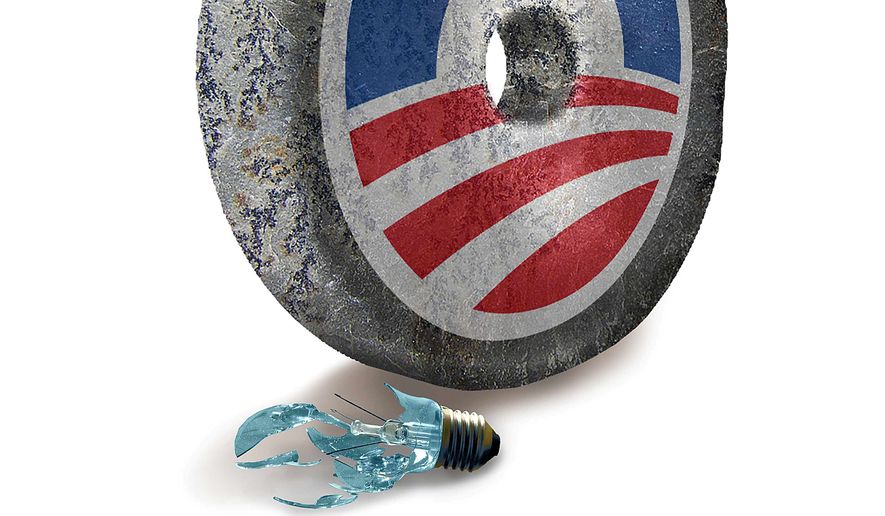OPINION:
With the best intentions, and naively going along with the corporate world’s hugely financed publicity machine, Congress is about to stomp on America’s most creative citizens, its inventors.
The target is not the much-hyped “patent trolls.” They are a minuscule matter. What’s at stake is average Americans’ constitutional right to own what they’ve created. We’re really up against corporate lawyers acting like ogres, devouring the little guy’s innovative accomplishments.
Many of my colleagues, without understanding the legislation’s impact, will soon vote on “HR 9,” a misnamed “patent reform,” also dubbed “pro-innovation,” that is anything but. In reality, it deforms our patent system beyond recognition.
This legislation — pushed by my Republican colleague, House Judiciary Committee Chairman Bob Goodlatte, and deep-pocketed multinational corporations — appears on its way, again through the House, to the Senate, thence to an eager President Obama for signing.
When that happens, America’s exceptional system of invention will be shoveled into the depths of mediocrity, there to seep into the murk in which less scrupulous global competitors spend their resources.
In the last session, a bipartisan band of my Republican friends (some of whom made their pre-political marks as patent-holding inventors); members of the Black Caucus; and a heroic Ohio congresswoman, Democrat Marcy Kaptur, failed to dissuade our House colleagues that the bill was not the litigation-curbing effort as advertised.
The bill went to the Senate where, fortunately, it stalled. It’s back, this time resurfacing in the House with just one hearing. A whole class of small inventors, among the many who will be injured, is being kissed off as scarcely deserving a voice. All in a day’s work for the corporate influencers who shaped HR 9 from start to finish.
Just because a measure holds itself up as “tort reform” should not mean it escapes the scrutiny of free-market Republicans. It should instead call for a skeptical second look, and then more throughout its progress. Guaranteed: Such close-eyed analyses of this bill will encourage deep suspicion.
Fair-minded members will find themselves aghast at how this leaves defenseless our individual inventors, small and midsized companies, researchers, even universities who depend financially on their patent portfolios. It is a coup in the making by the biggest and best protected operators.
Preposterously, even the United States Defense Advanced Research Projects Agency, with its multiple patents, under this law would fall into the dread category of “patent trolls.” These scary creatures who hide under bridges were themselves plucked from mythology by corporate marketers to misrepresent what is at stake.
Legislative reform efforts invariably build on a narrative of great injustice. This one moves wildly beyond the need to fix real abuses, wherein at considerable cost companies must defend their legitimately acquired patents against unscrupulous claimants.
But the term “patent troll,” directed against such bad actors, has been transmogrified by corporate marketers to include legitimate small inventors — many of them minorities, which is why my Black Caucus friends sized up the issue astutely — who are outgunned and outspent when they try to protect their intellectual property.
Almost all infringement cases are brought by people who own a patent legitimately. If not, such cases should be decided in court. There is nothing wrong with bringing such matters to court — a cornerstone, not of crony capitalism, but of the free market itself.
Our economy and culture depend on the disruptive nature of innovation. Our Constitution deliberately made all people equal, giving no advantage to those of social status, wealth or position. The founders, even before they added the Bill of Rights, secured the right to hold patents in the Article I of the Constitution itself, the only right mentioned prior to the amendments.
We all know our country’s history of innovation. Large companies reject new ideas. It is the innovator who challenges the status quo, not the corporation.
Under the proposed bill, the pretrial discovery process — just one part of many dubious sections — tilts heavily against the small inventor, who of course must share his or her secrets with an opposing corporation’s well-armed legal team. In another era, I might have considered this an innocent, unintended consequence of ill-considered drafting. Not now.
I implore my colleagues in both the House and Senate to stop this monster aborning. If it helps, take a slow, thoughtful walk along the National Mall, which overwhelmingly celebrates American inventiveness.
The Air and Space Museum? It would not exist without patents as we have known them.
That unfinished African-American history museum? Doubtless it will honor the numerous minority patent holders to whom we all are indebted and who wouldn’t have had a chance without our first civil right: the right to invent and reap the rewards from intellectual property.
This Republican Congress must not allow this creativity-killing legislation to be a part of its legacy.
• Rep. Dana Rohrabacher, a Republican, represents California’s 48th District. He serves on the House Science and Technology Committee.




Please read our comment policy before commenting.